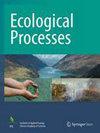Fuzzy evaluation and obstacle factors of urban ecological health changes in the Wei River Basin, northwest China
IF 3.9
2区 环境科学与生态学
Q1 ECOLOGY
引用次数: 0
Abstract
Urban ecological health is crucial for the long-term sustainable development of watershed. Accurately evaluating the health level of the ecological environment helps to develop reasonable strategies for ecological environment restoration and resource management. This paper constructed a comprehensive evaluation index system based on the Pressure-State-Response (PSR) framework and evaluated the ecological health of eleven administrative regions in the Wei River Basin (WRB), northwest China in 1980, 2000, and 2020 using an evaluation model established by fuzzy mathematics. Further, obstacle degrees were used to quantify the contribution of pressure, state, and response modules, as well as individual indicators to ecological health. The comprehensive evaluation system constructed based on the PSR framework could effectively reflect the ecological health conditions of different regions in the WRB. During the study period, the ecological health went through a process of first deterioration and then improvement. By 2020, the ecological health of seven administrative regions reached healthy levels. The state module was the main obstacle module of the PSR framework to the ecological health of the most regions. The population density (P1), patch density of construction land (S5), comprehensive elasticity index (S8), soil erosion index (R1), and per capital GDP (R3) were the most crucial individual indicators affecting the ecological health. For different cities, the main obstacle factors varied. In economically developed cities, the limiting effect of P1 was more significant, while in economically underdeveloped cities, the limiting effect of R3 was stronger. In response to the special natural environment and socio-economic conditions of arid and semi-arid areas in the WRB, an ecological health evaluation index system suitable for the characteristics of the basin was constructed. The results indicated that, to improve the levels of urban ecological health, it is necessary to restore the natural ecological environment and control population size while accelerating economic construction. Our results can provide scientific support for the ecological health evaluation and protection of the WRB and even the arid and semi-arid areas in northwest China.中国西北部渭河流域城市生态健康变化的模糊评价与障碍因素
城市生态环境健康对流域的长期可持续发展至关重要。准确评价生态环境健康水平有助于制定合理的生态环境修复和资源管理策略。本文构建了基于压力-状态-响应(PSR)框架的综合评价指标体系,并利用模糊数学建立的评价模型对西北渭河流域 11 个行政区域 1980 年、2000 年和 2020 年的生态环境健康水平进行了评价。此外,还利用障碍度量化了压力、状态和响应模块以及单个指标对生态健康的贡献。基于PSR框架构建的综合评价体系能有效反映西江源地区不同区域的生态健康状况。研究期间,生态健康状况经历了先恶化后改善的过程。到 2020 年,7 个行政区域的生态健康状况达到健康水平。状态模块是影响大部分地区生态健康的主要障碍模块。人口密度(P1)、建设用地斑块密度(S5)、综合弹性指数(S8)、水土流失指数(R1)和人均 GDP(R3)是影响生态健康最关键的单项指标。不同城市的主要障碍因素各不相同。在经济发达的城市,P1 的限制作用更为显著,而在经济欠发达的城市,R3 的限制作用则更强。针对西江流域干旱半干旱地区特殊的自然环境和社会经济条件,构建了适合流域特点的生态健康评价指标体系。结果表明,要提高城市生态健康水平,必须在加快经济建设的同时,恢复自然生态环境,控制人口规模。研究结果可为西哈努克蒙古自治州乃至西北干旱半干旱地区的生态健康评价与保护提供科学支撑。
本文章由计算机程序翻译,如有差异,请以英文原文为准。
求助全文
约1分钟内获得全文
求助全文
来源期刊

Ecological Processes
Environmental Science-Ecological Modeling
CiteScore
8.50
自引率
4.20%
发文量
64
审稿时长
13 weeks
期刊介绍:
Ecological Processes is an international, peer-reviewed, open access journal devoted to quality publications in ecological studies with a focus on the underlying processes responsible for the dynamics and functions of ecological systems at multiple spatial and temporal scales. The journal welcomes manuscripts on techniques, approaches, concepts, models, reviews, syntheses, short communications and applied research for advancing our knowledge and capability toward sustainability of ecosystems and the environment. Integrations of ecological and socio-economic processes are strongly encouraged.
 求助内容:
求助内容: 应助结果提醒方式:
应助结果提醒方式:


